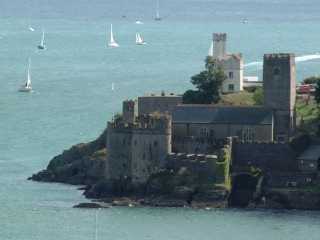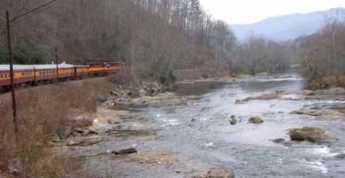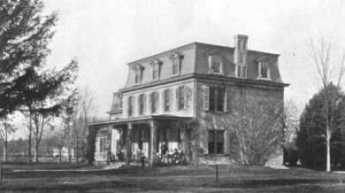Related Topics
Philadelphia Fish and Fishing
Less than a century ago, Delaware Bay, Delaware River, Schuylkill River, Pennypack Creek, Wissahickon Creek, and dozens of other creeks in this swampy region were teeming with edible fish, oysters and crabs. They may be coming back, cautiously.
City of Rivers and Rivulets
Philadelphia has always been defined by the waters that surround it.
Customs, Culture and Traditions
Abundant seafood made it easy to settle here. Agriculture takes longer.
Historical Motor Excursion North of Philadelphia
The narrow waist of New Jersey was the upper border of William Penn's vast land holdings, and the outer edge of Quaker influence. In 1776-77, Lord Howe made this strip the main highway of his attempt to subjugate the Colonies.
Montgomery and Bucks Counties
The Philadelphia metropolitan region has five Pennsylvania counties, four New Jersey counties, one northern county in the state of Delaware. Here are the four Pennsylvania suburban ones.
Life On The River (3)

|
| Darth Mouth Castle |
All over Europe the scene is repeated: a market town and seaport at the mouth of a river, with many miles of riverbank castles in the hinterland. The seaports had to be fortified against pirates, the hinterland against marauding brigands. But the two flows of commerce consisted of baronies upriver feeding the seaport, while secondarily their seaports carried on trade with nearby river-organized economies. From time to time, someone like Julius Caesar, Napoleon, Bismarck or Hitler would try to unify the various river economies, usually unsuccessfully. In fact, the same pattern was seen along the Pacific Coast of South America, until the Incas figured out how to go along the mountain ridge in the far interior, and then come down the rivers from the sparsely populated areas to the maritime settlements at the mouth of the river, whose defenses were planned for enemies from the sea. Philadelphia followed the commercial pattern, but without fortresses and castles.
Because of the vagaries of King Charles II, and underneath that, because of marshes and their mosquito-borne diseases, the Delaware Bay was settled fairly late in colonial times -- and almost entirely by Quakers. The Dutch were interested in fur trading rather than settlement, the Dutch were anyway too few, their sovereign too indifferent, and William Penn took care of the Indians. So the English settlers had no one to fight except other Englishmen, once the French stab at Inca-like strategy was put down in 1753. After 1783, or perhaps 1812, the world finally left us alone. The Delaware Bay and River are essentially free of fortresses, Philadelphia has no castles. The peaceful sixty miles of upper Delaware Bay became lined with big farmhouses, or big Federalist and Victorian mansions. For a century, from the Revolutionary War to the Civil War, and even for a time after that, the history of this peaceful pond reads like a novel by Jane Austen.
As a playground for menfolk, it would be hard to improve on Victorian Delaware Bay. The river was full of fish, notably shad. In the fall, the migrating ducks and geese made for marvelous hunting. In the countryside behind the riverfront, houses were found all the sports having to do with horses; fox hunting, racing, horses shows. The kids could putter around in small sailboats, the adult sailors could sail a yacht to Europe if they wanted to. After John Fitch invented the Steamboat, it was possible to take a daily commute to the best male game of all -- trading, investing and gambling in the financial and commercial center of Philadelphia.

|
| Shad |
Marion Willis Rivinus and Katherine Hansel Biddle wrote a little book in 1973 called Lights Along the Delaware which tells the river story from the female point of view. The woman of the house was sort of the mayor of a little city, organizing the staff, supervising the garden, educating the children, planning the household, and organizing the dinners and social events. Educated and trained to the role, she knew what to do and enjoyed doing it. Jane Austen wrote the handbook. And while the menfolk were essential members of the cast of characters, women were the managing directors. The men were off with their horses, or sailboats, or fishing rods, or their faraway big-deal mergers and acquisitions. True, it was not a notably intellectual community, there was no Edith Wharton, Abigail Adams or Emily Dickinson. You might find some of that in Germantown, perhaps. The professions, law, and medicine, lured the more studious male members away from Society, but the international diplomatic circle was seen as the ideal career for any truly graceful graduates of this environment.

|
| Riverbank Railroad |
As the riverbank was gradually destroyed by railroads and expressways, only a few mansions like Andalusia remain in good repair. Curiously, what endures best are the clubs. The fishing club variously called the Fish House, the Castle, the Colony in Schuylkill, or the Schuylkill Fishing Company of the State in Schuylkill, has moved as many times as the name has changed. Started in 1732, it is the oldest continuously existing men's club in the world. It moved to the Delaware River from the Schuylkill when the Fairmount dam was built, and to its present location at Devon, the estate of William B. Chamberlain in 1937. New members do the cooking, cleaning, and serving, older members tell stories. When the river pollution is finally controlled, they may go back to catching the fish as well as cooking them. There's the Philadelphia Gun Club, which before 1877 was the Public Holiday Shooting Club of Riverton NJ. And then there's the Gloucester (NJ) Fox Hunt, which during the Revolution turned into First Troop, Philadelphia City Cavalry. After escorting George Washington to the battles of Boston Harbor, The Troop has been an active fighting unit of the National Guard (most recently in Bosnia) as well as a devoted center of male horsemanship between wars. The Farmer's Club, the Agricultural Society, and the Horticultural Society all reflect the rural interests that once predominated just behind the riverfront estates, still thriving aloof after 150 years of suburbia, exurbia and urban revival.

|
| Philadelphia Gun Club |
Although the riverfront industrial slums which destroyed the Philadelphia branch of Jane Austen's gracious living subculture are themselves declining and seem about to go away, it would take a real visionary to imagine how the Grand Life on the River will ever return. The banks of Delaware are much lower than the bank of the Hudson, for example. They make a great place to put high-speed rail lines and even higher speed interstate highways. The patrons of Hyde Park, West Point, and Poughkeepsie are much higher up a cliff and can overlook the river without much noticing an occasional whoosh. The mansions along Delaware have to look right at the tracks. Except for a few places like Bristol which have become isolated on the river side of the tracks and highway, it's not easy to see how you would get from here to there, or when.
Originally published: Thursday, November 01, 1990; most-recently modified: Tuesday, April 30, 2019
| Posted by: Willie | Nov 6, 2009 8:47 PM |
As a Delaware River boater out of Neshaminy State Marina, I am much interested in mansions and sights along both sides of the river.
Do you have any information on regulary scheduled commuter river traffic in the past. I also wonder about the concrete steps leading to the river hustr north of Linden Ave in NE Philly. Any resources on that?
Thanks.
Rich
bayliner29@aol.com
| Posted by: Richard Cohen | Jul 15, 2009 7:03 PM |
| Posted by: Donald Kaas | Nov 7, 2008 4:50 PM |
This is the e-mail address he gave..